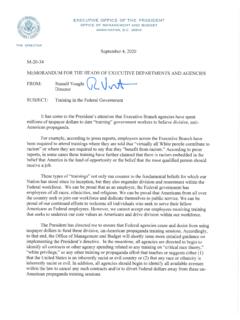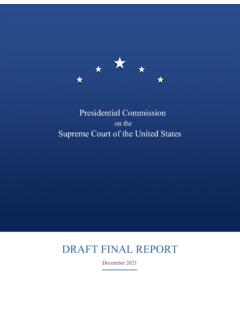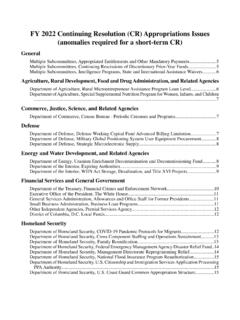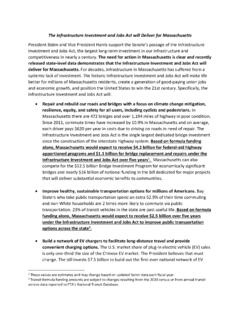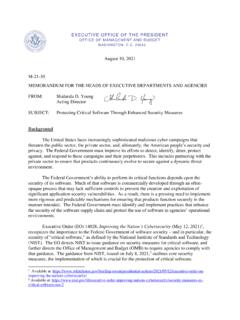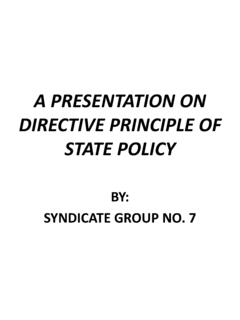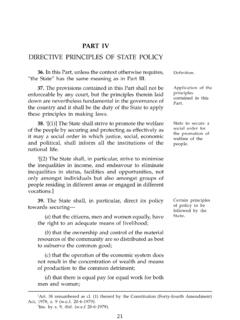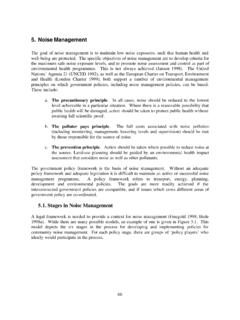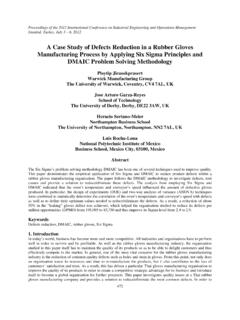Transcription of PROTECTING THE INTEGRITY OF GOVERNMENT SCIENCE
1 PROTECTING THE INTEGRITY OF GOVERNMENT SCIENCE A Report by the scientific INTEGRITY FAST-TRACK ACTION COMMITTEE of the NATIONAL SCIENCE AND TECHNOLOGY COUNCIL January 2022 PROTECTING THE INTEGRITY OF GOVERNMENT SCIENCE i Foreword In his first days in office, President Biden affirmed that evidence-based decisions and policy informed by robust SCIENCE and unimpeded by political interference is a core pillar of the Biden-Harris administration. A robust democracy requires a common wellspring of reliable information. scientific and technological information, data, and evidence are crucial to the American public s health, safety, and prosperity, and to the development, assessment, and equitable delivery of Federal programs and services.
2 The American public has the right to expect from its GOVERNMENT accurate information, data, and evidence and scientifically-informed policies, practices, and communications. This requires scientific INTEGRITY based on rigorous scientific research that is free from politically motivated suppression or distortion. Violations of scientific INTEGRITY damage trust in both SCIENCE and GOVERNMENT . These lapses are contrary to the core ideals of the scientific enterprise, including openness, transparency, honesty, equity, and objectivity. They also erode the morale and innovation of Federal scientists and technologists.
3 Responding to the President s call to evaluate current policies and practices and to propose needed improvements, nearly five dozen Federal scientists brought a range of methods and perspectives to their work as members of the scientific INTEGRITY Task Force. This work was broad in scope. Because evidence-based policymaking happens across GOVERNMENT , the task fell not only to the SCIENCE agencies, but also to all agencies and departments engaged in the production, analysis, communication, and use of evidence, SCIENCE , and technology. The release of this important report is the culmination of the Task Force s efforts and the first-ever comprehensive assessment of scientific INTEGRITY policy and practices in the GOVERNMENT .
4 We thank the Task Force members and the many others who contributed their insights, experiences, and recommendations. In 2009, the Obama Administration identified six principles of scientific INTEGRITY . Drawing on the insights and highlighted areas of needed improvement in the 2021 Task Force report, five additional principles warrant special mention: Dissent. SCIENCE benefits from dissent within the scientific community to sharpen ideas and thinking. Scientists ability to freely voice the legitimate disagreement that improves SCIENCE should not be constrained. Whole of GOVERNMENT . Because evidence-based policymaking happens across GOVERNMENT , scientific INTEGRITY policies should apply not only to SCIENCE agencies, but to all Federal agencies and departments engaged in the production, analysis, communication, and use of evidence, SCIENCE , and technology.
5 These policies must also apply to all career employees, contractors, and political appointees. SCIENCE at the policy table. For SCIENCE to inform policy and management decisions, it needs to be understood and actively considered during decision-making. This requires having scientists participate actively in policy-making. PROTECTING THE INTEGRITY OF GOVERNMENT SCIENCE ii Transparency in sharing SCIENCE . Transparency underpins the robust generation of knowledge and promotes accountability to the American public. Federal scientists should be able to speak freely, if they wish, about their unclassified research, including to members of the press.
6 Accountability. Violations of scientific INTEGRITY should be considered on par with violations of GOVERNMENT ethics, with comparable consequences. These principles will guide OSTP s ongoing assessment and coordination of Federal scientific INTEGRITY policy. In the coming months, OSTP will draw upon the findings of the Task Force to develop a plan for the regular assessment and iterative improvement of scientific INTEGRITY policies and practices. In addition, agency leadership, working closely with OSTP, will deploy this framework to ensure that their scientific INTEGRITY policies are informed by Task Force report and adhere to scientific INTEGRITY principles .
7 The release of the Task Force report provides an opportunity to salute the scientists and technologists across GOVERNMENT , who every day make SCIENCE -informed and evidence-based policymaking a reality and, in so doing, strengthen trust in GOVERNMENT . Through their excellence, innovation, and professionalism, they inspire and serve the Nation. Eric Lander Director, Office of SCIENCE and Technology Policy Alondra Nelson Deputy Director for SCIENCE and Society, Office of SCIENCE and Technology Policy Jane Lubchenco Deputy Director for Climate and Environment, Office of SCIENCE and Technology Policy PROTECTING THE INTEGRITY OF GOVERNMENT SCIENCE iii About the National SCIENCE and Technology Council The National SCIENCE and Technology Council (NSTC) is the principal means by which the Executive Branch coordinates SCIENCE and technology policy across the diverse entities that make up the Federal research and development enterprise.
8 A primary objective of the NSTC is to ensure SCIENCE and technology policy decisions and programs are consistent with the President's stated goals. The NSTC also prepares research and development strategies that are coordinated across Federal agencies aimed at accomplishing multiple national goals. The work of the NSTC is organized under committees that oversee subcommittees and working groups focused on different aspects of SCIENCE and technology. More information is available at About the Office of SCIENCE and Technology Policy The Office of SCIENCE and Technology Policy (OSTP) was established by the National SCIENCE and Technology Policy, Organization, and Priorities Act of 1976 to provide the President and others within the Executive Office of the President with advice on the scientific , engineering, and technological aspects of the economy, national security, homeland security, health, foreign relations, the environment, and the technological recovery and use of resources, among other topics.
9 OSTP leads interagency SCIENCE and technology policy coordination efforts, assists the Office of Management and Budget with an annual review and analysis of Federal research and development in budgets, and serves as a source of scientific and technological analysis and judgment for the President with respect to major policies, plans, and programs of the Federal GOVERNMENT . More information is available at About the scientific INTEGRITY Fast-Track Action Committee The scientific INTEGRITY Fast-Track Action Committee (SI-FTAC) is an interagency forum for discussing scientific INTEGRITY and facilitating improvement of policies that promote scientifically informed, evidence-based decision-making at the Federal level.
10 The SI-FTAC is charged as the Task Force on scientific INTEGRITY to support short-term, high-priority tasks to implement the January 2021 Presidential Memorandum on Restoring Trust in GOVERNMENT Through scientific INTEGRITY and Evidence-Based Policymaking and lay the groundwork for longer-term coordination of agency efforts related to scientific INTEGRITY . It aims to offer insight and analysis that will move the Federal GOVERNMENT toward a more trustworthy SCIENCE system to serve the American people. About this Document This report is the first product of the SI-FTAC. As called for in the 2021 Presidential Memorandum, it assesses scientific INTEGRITY policies of Federal departments and agencies and instances in which they have not been followed or enforced, and it identifies effective practices for strengthening scientific INTEGRITY in specific areas, including training and transparency in scientific INTEGRITY , handling scientific disagreements, supporting professional development of Federal scientists, addressing emerging challenges to scientific INTEGRITY , and effective communication of the results of Federal scientific activities.


